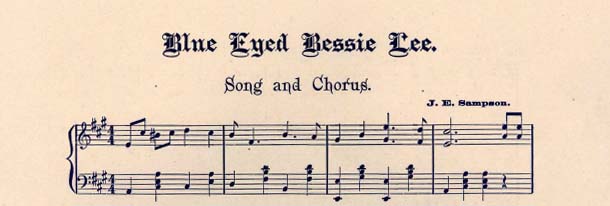
Historic Sheet Music Collection
Document Type
Score
Publication Date
1865
Lyrics
[Verse 1]
At sixteen of age I was my mother’s fairhaird boy,
She kept a little huxter shop, her name it was Malloy;
“I’ve fourteen children” Pat says she “which heav’n to me has sent,
But children aint like pigs you know they can’t pay the rent!”
She gave me ev’ry shilling there was in the till,
And kiss’d me fifty times or more, as if she’d never get her fill,
“Oh heav’n bless you Pat,” says She “and don’t forget my boy
That ould Ireland is your country, and your name is Pat Malloy!”
[Verse 2]
Oh, England is a purty place, of goold there is no lack
I truaged from York to London wid me saythe upon me back;
The English girls are beautiful, their loves I don’t decline,
The eating and the drinking too is beautiful and fine;
But in a corner of me heart which nobody can see
Two eyes of Irish Blue are always peeping out at me!
Oh golly darling never fear I’m still your own dear boy
Ould Ireland is me country, and me name is Pat Malloy.
[Verse 3]
From Ireland to America across the seas I roam
And every shilling that I got ah sure I sent it home;
Me mother couldn’t write but oh there came from Father Royce:
“Oh heaven bless you” Pat says she I hear me mother’s voice!
But not I’m going home again, as poor as I began,
To make a happy girl of Noll and sure I think I can;
The pockets they are empty but me heart is fill’d wid joy:
For ould Ireland is me country, and me name is Pat Malloy.
Recommended Citation
Boucicault, Dion Esq. and Cook, John L. Esq., "Pat Malloy" (1865). Historic Sheet Music Collection. 1178.
https://digitalcommons.conncoll.edu/sheetmusic/1178
The views expressed in this paper are solely those of the author.
Comments
Pat Malloy
Originally sung with Immense Success by Mr. Dan Bryant.
Words by Dion Boucicault Esq.
Arranged by John L. Cook Esq.
New York: Wm. A. Pond & Co. (1865)
Some of these resources may contain offensive language or negative stereotypes. Such materials should be seen in the context of the time period and as a reflection of attitudes of the time. The items are part of the historical record, and do not represent the views of the library or the institution.